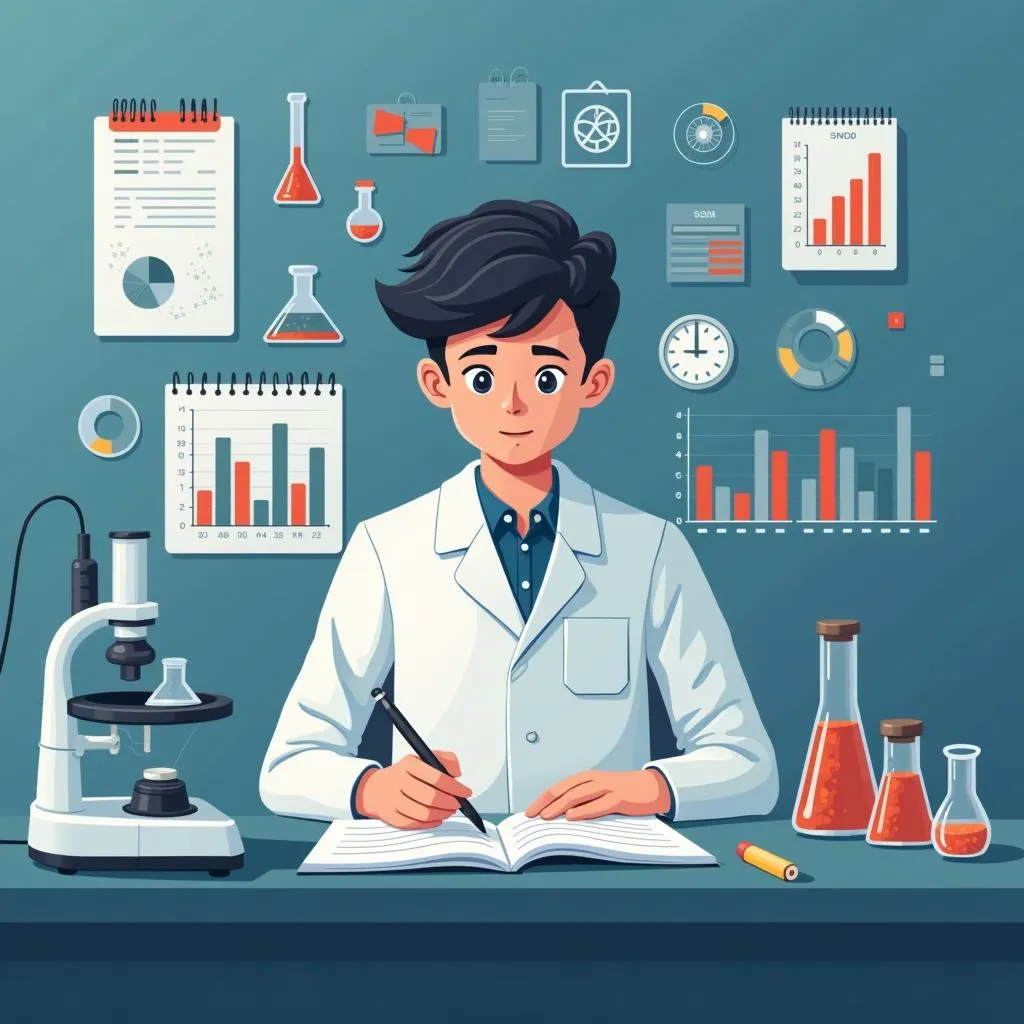Group projects are a common topic in IELTS Speaking tests, particularly in Part 2. Being able to effectively describe a project you worked on with a group is crucial for achieving a high score. This article will guide you through the process of answering such questions, providing sample responses and expert tips to help you excel in your IELTS Speaking exam.
Nội dung bài viết
Part 1: Introduction and Interview
In Part 1, the examiner may ask you some general questions about group work and projects. Here’s a sample question with a suggested answer:
Question: Do you prefer working alone or in a group?
Sample answer (Band 7-8):
“Well, it really depends on the nature of the task at hand. For complex projects that require diverse skills and perspectives, I find group work to be more effective and enjoyable. However, for tasks that demand deep concentration or individual creativity, I tend to prefer working alone. In general, I’d say I appreciate the collaborative aspect of group work, as it often leads to more innovative solutions and helps me develop my interpersonal skills.”
 IELTS Speaking: Discussing group work preference
IELTS Speaking: Discussing group work preference
Part 2: Long Turn
In this section, you’ll be given a cue card related to describing a group project. Here’s a sample cue card:
Describe a project you worked on with a group. You should say:
- What the project was about
- Who you worked with
- What your role in the project was
- And explain whether you think the project was successful
Sample answer (Band 8-9):
“I’d like to talk about a particularly memorable group project I was involved in during my final year of university. The project was centered around developing a sustainable urban garden for our campus, which aimed to promote environmental awareness and provide fresh produce for the university cafeteria.
Our team consisted of five students from diverse academic backgrounds, including environmental science, architecture, and business management. This interdisciplinary approach allowed us to tackle the project from multiple angles, ensuring a comprehensive solution.
As for my role, I was primarily responsible for the financial planning and sustainability aspects of the project. This involved creating a budget, researching potential funding sources, and developing a long-term maintenance plan to ensure the garden’s viability beyond our involvement.
In my opinion, the project was undeniably successful. Not only did we manage to create a thriving green space that continues to serve the university community, but we also exceeded our initial goals in terms of crop yield and student engagement. The garden has since become a model for other institutions looking to implement similar initiatives.
What I found particularly rewarding was how our diverse skill sets complemented each other, allowing us to overcome challenges more effectively than if we had worked individually. This experience really reinforced the value of collaborative work and has since influenced my approach to tackling complex problems in both academic and professional settings.”
Follow-up questions:
- What challenges did you face during the project?
- How did you resolve conflicts within the group?
Sample answer for follow-up questions (Band 8-9):
“One of the main challenges we encountered was balancing the aesthetic design of the garden with its practical functionality. Our architecture team member had ambitious plans for the layout, which sometimes conflicted with the optimal growing conditions for certain plants. To resolve this, we held several brainstorming sessions where we encouraged open dialogue and creative problem-solving. Ultimately, we reached a compromise by incorporating vertical gardening techniques that allowed us to maximize space while maintaining an appealing design.
Regarding conflict resolution, we established a system of regular check-ins and open communication from the outset. Whenever disagreements arose, we made sure to address them promptly and respectfully. For instance, when there was a debate about budget allocation, we organized a meeting where each team member presented their case, followed by a collaborative decision-making process. This approach helped us maintain a positive group dynamic throughout the project and ensured that everyone felt their voice was heard.”
 IELTS Speaking: Describing a sustainable urban garden project
IELTS Speaking: Describing a sustainable urban garden project
Part 3: Two-way Discussion
In Part 3, the examiner will ask more abstract questions related to the topic. Here are some sample questions with suggested answers:
Question: What are the benefits of group projects in education?
Sample answer (Band 7-8):
“Group projects in education offer numerous benefits. Firstly, they mirror real-world work environments, preparing students for future careers where collaboration is often essential. They also foster critical thinking and problem-solving skills, as students must navigate different perspectives and find common ground. Additionally, group projects enhance communication abilities, teaching students how to articulate their ideas clearly and listen actively to others. Lastly, they can boost creativity by bringing together diverse viewpoints and skill sets, often resulting in more innovative solutions than individual work might produce.”
Question: How has technology changed the way people collaborate on projects?
Sample answer (Band 8-9):
“Technology has revolutionized collaboration in myriad ways. Cloud-based platforms now allow team members to work on documents simultaneously, regardless of their physical location, greatly enhancing efficiency. Video conferencing tools have made remote meetings far more engaging and productive, bridging geographical divides that once hindered collaboration. Project management software has streamlined task allocation and progress tracking, ensuring better coordination among team members. Moreover, AI-powered tools are increasingly being used to analyze data and suggest optimal strategies, augmenting human decision-making in complex projects. However, it’s worth noting that while technology facilitates collaboration, it also requires team members to develop new skills, such as digital literacy and online communication etiquette, to fully leverage these tools effectively.”
 IELTS Speaking: Technology's impact on project collaboration
IELTS Speaking: Technology's impact on project collaboration
Key Vocabulary and Phrases for High Scores
To achieve a high score in IELTS Speaking, it’s crucial to use a range of sophisticated vocabulary and expressions. Here are some key terms and phrases related to group projects:
-
Collaborative effort /kəˈlæb.ər.ə.tɪv ˈef.ət/ (noun phrase): A task or project where people work together.
Example: “The successful completion of the project was truly a collaborative effort.” -
Synergy /ˈsɪn.ə.dʒi/ (noun): The interaction of elements that when combined produce a total effect greater than the sum of the individual elements.
Example: “The synergy within our team led to innovative solutions we wouldn’t have discovered individually.” -
To delegate /ˈdel.ɪ.ɡeɪt/ (verb): To give a particular job, duty, right, etc. to someone else so that they do it for you.
Example: “As the project leader, I had to learn how to delegate tasks effectively.” -
Interpersonal skills /ˌɪn.təˈpɜː.sən.əl skɪlz/ (noun phrase): The abilities used to work well with other people.
Example: “Working on group projects has significantly improved my interpersonal skills.” -
To brainstorm /ˈbreɪn.stɔːm/ (verb): To suggest a lot of ideas for a future activity very quickly before considering them carefully.
Example: “We spent the first meeting brainstorming potential solutions to the problem.”
Using these terms and phrases appropriately in your responses can demonstrate a high level of English proficiency and help you achieve a better score in your IELTS Speaking test.
Examiner’s Advice
To excel in the IELTS Speaking test, particularly when describing group projects, consider the following tips:
-
Practice extensively: Regularly practice describing various group projects you’ve been involved in, focusing on different aspects each time.
-
Use specific examples: Always support your points with concrete examples from your experiences. This adds authenticity to your responses.
-
Demonstrate reflection: Show that you’ve learned from your experiences by discussing what worked well and what could have been improved in your group projects.
-
Vary your language: Use a range of vocabulary and grammatical structures to showcase your language proficiency.
-
Stay coherent: Ensure your ideas flow logically from one point to the next, using appropriate linking words and phrases.
-
Engage with the examiner: Maintain eye contact and show enthusiasm about the topic to create a positive impression.
By following these guidelines and consistently practicing, you can significantly improve your performance in the IELTS Speaking test, particularly when discussing group projects and collaborative work.
Describe a time when you took a break from your routine to refresh your mind and approach group projects with renewed energy. This can help you bring new perspectives to your collaborative efforts.
Remember, success in IELTS Speaking is not just about language skills, but also about effectively communicating your experiences and ideas. With proper preparation and practice, you can confidently tackle any question about group projects and achieve the score you desire.


